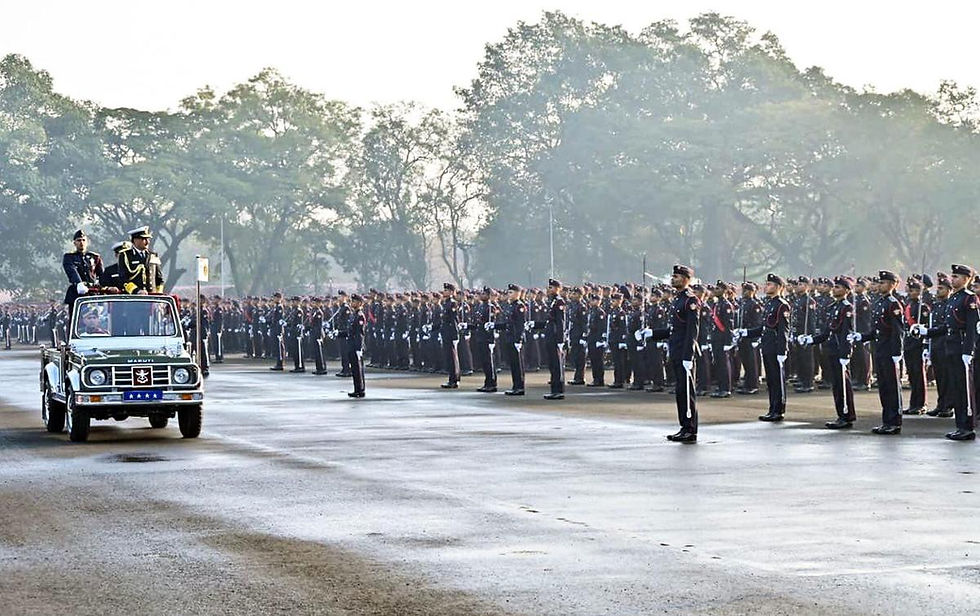Bridging The Divide: Integrating Political Goals With Military Capability
- Brig DS Sarao

- Jun 23
- 4 min read
For the past few days, we have been following the discussions (and comments, many unwarranted) on a very emotive issue.
'Operation Sindoor'
Three things are evident in the views of the MVI readership.
Was the operation a political and military mis-calculation?

Was it more of a propaganda exercise?
Did we achieve our objective/aim-- if at all there was one?
Irrespective, there is an incredibly important and nuanced point about the intersection of military decision-making and political considerations inherrent here.
When military operations are overshadowed by political motives or dictated by political agendas, it often leads to significant strategic and operational failures, a feeling of disillusionment, especially where the integrity of military planning is compromised by the pressures of political narratives, media sensationalism, and self-preserving institutional behavior.

Whenever political considerations overshadow national objectives in the use of military power it reflects on the incompetency of leadership.
Both military and civilian.
We have had two instances in the recent past, which have left the leadership, both civilian and military with a bit of egg on the face.
Outlandish claims of hundreds of terrorist killed in the earlier strike and destruction of terrorist camps/infrastructure in the other has not only destroyed national credibility within and without, but also reinforced the need for introspection of our military doctrines, specially with reference to employment of air power and control of the electronic and space spectrum.
The problem is not of making mistakes or taking incorrect decisions-- political or military; it is the unfortunate 'ostrich policy' resonating in many military minds and 'experts' in this forum and elsewhere. Before going any further, let me state that the capability and expertise of the Indian military is not the issue here.

It is the defensive mechanism to avoid confronting inconvenient discussions and truths, especially when there’s public pressure and fear of political fallout; and this is counterproductive in the long run. Infact, it can be disastrous, as it prevents meaningful introspection and the corrective measures needed for improvement.
Rather than accepting mistakes and learning from them, the tendency is to deflect, cover up, or dismiss failures leading to stagnation and even more severe mis-steps in the future.
The vitrolic, unwarranted, incompetent and unreasonable backlash if some one wants to dwell on something so patently evident --that all is not hunkydory or that we have failed politically and militarily in what we had tried to achieve, is evident from the comments and discussions.
Avoidable traits in a credible military analyst or strategic thinker.
The important critique here is evident to all; less those with heads under the sand. It is about the lack of a clear political and military objective.
The 'selection and maintenance of aim'.
Without clear, mutually agreed-upon aims from both the political leadership and the military, any operation will be muddied and open to mis-interpretation.
The disconnect between political leaders and military leaders, along with the absence of a coherent strategic aim will inevitably lead to haphazard execution as is what has happened in our context.
This lack of alignment or a firm vision at the strategic level often results in poorly planned operations that lack focus or measurable outcomes.

And then we go into inannities of selecting some odd statement of someone with a differing viewpoint and start slashing it without examining the context of the argument made-- or ask questions which do not really require any answers, since the systemic failure is so blatantly visible that it is not even funny.
Now combine this with imaginary victories and garbage spewed by state and private media, the govt and by some military experts; the requirement to accept faulty planning, to examine, to analyse, to learn lessons, to correct mistakes is thrown into the 'discussion dustbin'.
It now becomes a free for all with personal barbs, inter service 'territorial protection' and 'I know better' -- to end the discussion.
So was the 'selection and maintenance of aim' evident in our recent adventures- No.

Was it more of a political stunt with military overtones - Yes.
Could it have been better planned with better inputs by the military- Yes.
Was a clear objective laid down by the political leadership - No.
Did the military formulate a clear aim for use of its combat power - No.
Was it the air forces 'finest hour'- No.
Did we go wrong in use of our resources and appreciation of the enemy's resources - Yes.
-- And finally, have we demonstrated military competency or a bit of incompetency, poor planning and lack of coordination- you judge for yourself.

There is an urgent need for a more introspective approach, one that is rooted in honesty and a willingness to face the facts. Until that happens—until military leadership and political leaders are willing to scrutinize their decisions and the effectiveness of their strategies openly—there will always be this ongoing tension between the narratives spun for public consumption and the on-the-ground reality that doesn’t always align with those stories.
An apt quote
"The truth will set you free, but first, it will make you miserable," --James A. Garfield)









Comments